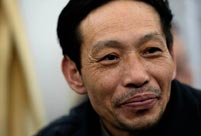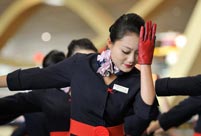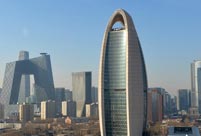 Int'l Snow Sculpture Art Expo in Harbin
Int'l Snow Sculpture Art Expo in Harbin Sichuan money wall for dividend payment
Sichuan money wall for dividend payment Li Na crashes Belinda Bencic in 2nd round at Australian Open
Li Na crashes Belinda Bencic in 2nd round at Australian Open
 Shocking moments when PLA's weapons open fire
Shocking moments when PLA's weapons open fire Famous Lanzhou beef noodles
Famous Lanzhou beef noodles Armed Police hold anti-terrorism drill in SE China's Xiamen
Armed Police hold anti-terrorism drill in SE China's Xiamen Harbin Int'l Ice and Snow Festival opens
Harbin Int'l Ice and Snow Festival opens 'Jin' named the word of the year by cross-strait netizens
'Jin' named the word of the year by cross-strait netizens Chinese scientific expedition goes to build new Antarctica station
Chinese scientific expedition goes to build new Antarctica station
NICOSIA, Jan. 27 -- Chinese Ambassador to Cyprus Liu Xinsheng, in an article published here, has criticized Japanese Prime Minister Shinzo Abe's visit to a war shrine in Tokyo last December.
In the article published in Cyprus' leading English-language newspaper Cyprus Mail on Sunday, Liu said history should not be forgotten.
Despite the enormous atrocities inflicted by Japanese aggressors, the Asians, very much like the Cypriots, are warm, open and always ready to forgive when the perpetrators are willing to repent, said the article titled "To Forgive Does Not Mean To Forget."
People believe that the convicted war criminals, not the ordinary Japanese people, were to blame, the article said. That explains why for all the atrocities committed by the Japanese aggressor troops, when the war was over, its Asian neighbors did not ask for a penny in war indemnities and were determined to work with the Japanese people to rebuild the shared neighborhood.
"That also explains why people in the Asia-Pacific found it reassuring when then Japanese Prime Minister Tomiichi Murayama said in 1995 that Japan followed a mistaken national policy and caused tremendous damage and suffering to the people of many countries, particularly to those of Asian nations through its colonial rule and aggression and recognized these facts as irrefutable," it added.
The article emphasized that a right-wing Japanese nationalist leader dares to challenge the remorseful statement of Murayama by disputing the nature of the war and by denying the hard facts.
This leader did it not because he wants to open dialogue with the leadership of Japan's neighbors, it said. He did it only to serve a clear political purpose. He wants to whitewash Japan's records of aggression and atrocities and push for his nationalist agenda.
Stressing "to forgive does not mean to forget," the article noted that aggression is aggression, a crime is a crime, and a war criminal is a war criminal.
Peace, which has been hard-won in East Asia after the war, can never be taken for granted, the article said. Japan's militarism was the curse of Asia in the first half of the 20th century. No one would like to see that happen again in the first half of this century.
History must be respected, facts must be respected, and human conscience must be respected, not those war criminals, it said.
The article said that the past should not stand in the way of the future. But forgetting the past without basic human values would be tantamount to forgetting the millions of lives sacrificed for the very peace and prosperity we enjoy today and would run the risk of seeing the horrors of the past all over again.
Abe's visit to Tokyo's Yasukuni Shrine last December, where 14 Japanese Class-A World War II criminals are honored, sparked protests from China and South Korea, as well as international criticism. The visit caused further deterioration in Japan's relations with China and South Korea.
 A 60-hour journey home
A 60-hour journey home Int'l Snow Sculpture Art Expo
Int'l Snow Sculpture Art Expo Highlights of China's air force
Highlights of China's air force Airline crew stage flashmob dance at Kunming airport
Airline crew stage flashmob dance at Kunming airport Top15 countries to retire to in 2014
Top15 countries to retire to in 2014 Hot supermodel's new photo album released
Hot supermodel's new photo album released Asia's heaviest box girder finishes 'rotation' in Wuhan
Asia's heaviest box girder finishes 'rotation' in Wuhan Completed facade of People's Daily new headquarters
Completed facade of People's Daily new headquarters Chinese-branded car passes North America standard safety test for the first time
Chinese-branded car passes North America standard safety test for the first time Li Na beats Bouchard to reach Australian final
Li Na beats Bouchard to reach Australian final  Explore the sources of PM 2.5
Explore the sources of PM 2.5 Highlights of Chinese airborne troops'exercises
Highlights of Chinese airborne troops'exercises  'Living in ice house' competition held in central China
'Living in ice house' competition held in central China  Chinese figure in Oscar nominations
Chinese figure in Oscar nominations  Top ten aerospace events in China 2013
Top ten aerospace events in China 2013Day|Week|Month